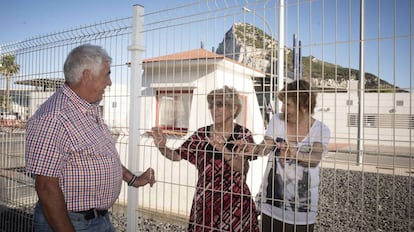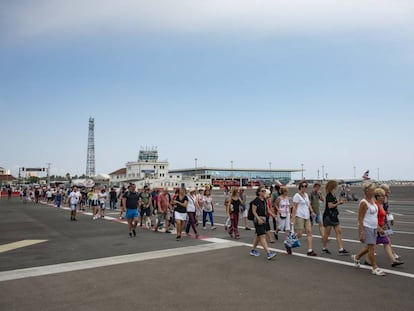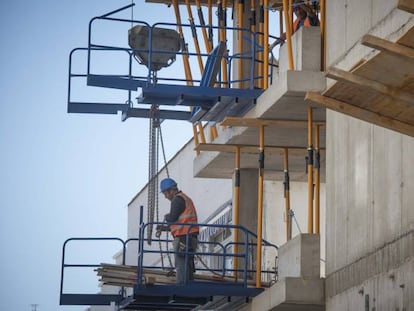With Brexit looming, memories of Gibraltar border shutdown resurface
Communities on both sides are observing the 50th anniversary of Franco’s decision to close all access to and from ‘The Rock,’ and recalling the dramatic effects that it had


Soaking wet and shaking with cold, Manuel Márquez gripped the bars of the border fence desperately. The lights from La Línea de la Concepción seemed close that night. It was the middle of November, and he had been unable to swim his way from Gibraltar to the Spanish side. So he jumped the fence instead (“I’m still not sure how,” he recalls) and walked past the Spanish police officers, who looked on in astonishment. Over on the Spanish side, Manuel’s family was holding a wake for their dead father, and he was determined to be there.
We need to stay together, like the family that we are
Eustaquia Aquilina
It was November 15, 1978, but Manuel is unable to shake the memory. Now 61, he goes over the events of that night once more, while his sister Eustaquia, 76, looks deeply moved as she listens. Theirs is one of the thousands of families that were torn apart overnight on June 8, 1969, when Spanish dictator Francisco Franco suddenly ordered the shutdown of the border separating the city of La Línea, in the Andalusian province of Cádiz, from the nearby British overseas territory.
As the 50th anniversary of that date approaches, the wounds of a separation that lasted 13 years are still fresh on both sides of the fence. And residents now fear that a similar situation could unfold due to Brexit. In response, both communities are observing the date with a series of exhibitions and talks. “Our young people don’t know what it was like, and it’s important to explain it to them,” says Encarnación Sánchez, the head of La Línea’s cultural department.
Shortages
When the border closed down in 1969, Gibraltar experienced such a shortage of goods that its hospital was even left without enough oxygen supplies. Around 10,000 Spanish workers suddenly lost their jobs on “The Rock,” as Gibraltar is commonly known, and began an exodus that took them all over Europe in search of employment.
“Emotionally, it was very intense. La Línea and Gibraltar were two communities that functioned as a single society,” explains Jennifer Ballantine, a historian and director of the Gibraltar Garrison Library.
That constant flow of people and goods through an open border had also led to the marriage of Manuel’s sister Eustaquia to Alberto Aquilina, a Gibraltarian with whom she had three daughters and who left this world “too soon.” Eustaquia was 26 and living in Gibraltar when the border was closed, and everything suddenly became very complicated. “I was left without a family, and with a husband and a daughter who were sick. I was very much alone,” she recalls. Her brother Manuel was still an 11-year-old child.
Emotionally, it was very intense
Jennifer Ballantine, historian
For the next 13 years, no border crossings were allowed, and direct maritime, telegraph and telephone communications were banned as well (phone calls would be allowed during Franco’s last years). It was the last step in an escalating conflict between Spain and Britain that had begun a decade earlier, notes Ballantine. Frustrated by its diplomatic failure to recover The Rock and by a sovereignty referendum in Gibraltar, the Franco regime responded by cutting off all access.
Overnight, 10,000 Spaniards lost their jobs across the border. La Línea became impoverished and has yet to emerge from that crisis despite the factories that Franco built in the area. Many Gibraltarians who lived in La Línea left their properties behind. The Rock was deprived of provisions, workers and basic supplies. Government employees would sweep the streets themselves after they finished their shifts.
On the other side
On the Spanish side, the parents of Eustaquia Aquilina and her eight siblings would go to the fence every Sunday to hear her yell out fresh news from across the border. This was the day when residents from both sides were allowed to see one another.
“We held on to the bars, we shook them and we screamed. We told each other the news, who had gotten married, if anyone had died. It was tough,” recalls Eustaquia, standing at the same border. Another way of communicating was to dedicate songs to each other on Gibraltar’s radio station, or to tinker with walkie-talkies and ham radio sets.
When Aquilina was widowed, her 19-year-old brother Manuel went to Gibraltar to work as a plumber. Their father passed away a year later, on November 15, 1978. An uncle telephoned to tell them about it. So Manuel jumped the fence, desperate to attend the wake. Police officers detained him as he did so, but took pity on him and allowed him to go pay his last respects. The next morning, they escorted him to Morocco, which was the way back into Gibraltar. “To this day, that is the only kind of police record I have,” says Manuel Márquez.
Overnight, 10,000 Spaniards lost their jobs in Gibraltar
The suffering ended on December 15, 1982. Márquez was the fourth person to cross the newly reopened border. He settled down in La Línea and made a living as a crossborder worker. But now that he has seen what a small retirement pension he will get after a lifetime of work, he regrets not having settled down in Gibraltar instead. “That was dumb of me.”
Now, with an uncertain Brexit looming on October 31, both communities are afraid that history could repeat itself, especially the older folks who have personal experience with the effects of a border shutdown. “We need to stay together, like the family that we are,” says Eustaquia Aquilina.
English version by Susana Urra.









































